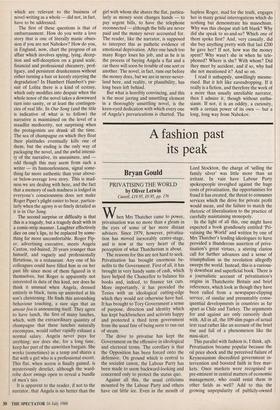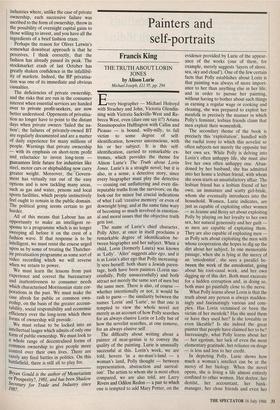A fashion past its peak
Bryan Gould
PRIVATISING THE WORLD by Oliver Letwin Cassell, f19.95, £9.95, pp. 176
hen Mrs Thatcher came to power, privatisation was no more than a gleam in the eyes of some of her more distant advisers. Since 1979, however, privatisa- tion has moved inexorably centre-stage, and is now at the very heart of the perception of what Thatcherism is about.
The reasons for this are not hard to seek. Privatisation has brought enormous be- nefits to the Government. First of all, it has brought in very handy sums of cash, which have helped the Chancellor to balance his books and, indeed, to finance tax cuts. More importantly, it has provided the Tories with an ideological cutting-edge which they would not otherwise have had. It has brought to Tory Government a sense of purpose, direction and identity which has kept backbenchers and activists happy and protected a third term government from the usual fate of being seen to run out of steam.
The drive to privatise has kept the Government on the offensive in ideological and electoral terms. The corollary is that the Opposition has been forced onto the defensive. On ground which is central to the socialist canon, the Labour Party has been made to seem backward-looking and concerned only to protect the status quo.
Against all this, the usual criticisms mounted by the Labour Party and others have cut little ice. Even in the mouth of Lord Stockton, the charge of 'selling the family silver' was little more than an irritant. In vain have Labour Party spokespeople inveighed against the huge costs of privatisation, the opportunities for fraud it has created, the threat to consumer services which the drive for private profit would mean, and the failure to match the rhetoric of liberalisation to the practice of carefully maintaining monopoly.
In the light of all this, one might have expected a book grandiosely entitled 'Pri- vatising the World' and written by one of Mrs Thatcher's leading ideologues to have provided a thunderous assertion of priva- tisation's great virtues, a stirring clarion call for further advances and a sense of triumphalism as the revolution allegedly sweeps the world. Instead, this is a curious- ly downbeat and superficial book. There is a journalistic account of privatisation's origins in Thatcherite Britain and brief references, which look as though they have been culled from a newspaper-clipping service, of similar and presumably conse- quential developments in countries as far apart as Chile and Turkey. The arguments for and against are only cursorily dealt with. All in all, the 109 slim pages of actual text read rather like an account of the brief rise and fall of a phenomenon like the mini-skirt.
This parallel with fashion is, I think, apt. Privatisation became popular because the oil price shock and the perceived failure of Keynesianism discredited government in- tervention and boosted faith in free mar- kets. Once markets were recognised as pre-eminent in central matters of economic management, who could resist them in other fields as well? Add to this the growing unpopularity of publicly-owned industries where, unlike the case of private ownership, each successive failure was ascribed to the form of ownership, throw in the possibility of overnight capital gains to those willing to invest, and you have all the ingredients of a brief fashion craze.
Perhaps the reason for Oliver Letwin's somewhat downbeat approach is that he perceives, I think correctly, that the fashion has already passed its peak. The stockmarket crash of last October has greatly shaken confidence in the infallibil- ity of markets. Indeed, the BP privatisa- tion was one of its immediate and obvious casualties.
The deficiencies of private ownership, and the risks that are run in the consumer interest when essential services are handed over to private profit-seekers, are now better understood. Opponents of privatisa- tion no longer have to point to the distant days when private owners 'failed the na- tion'; the failures of privately-owned BT are regularly documented and are a matter of daily experience for many millions of people. Warnings that private ownership — with its emphasis on short-term profit and reluctance to invest long-term guarantees little future for industries like steel, motor cars or shipbuilding now carry greater weight. Moreover, the Govern- ment has virtually run out of the easy options and is now tackling many areas, such as gas and water, prisons and local sports facilities, which people instinctively feel ought to remain in the public domain. The political going seems certain to get harder.
All of this means that Labour has an opportunity to make an intelligent re- sponse to a programme which is no longer sweeping all before it on the crest of a fashion wave. If that response is to be intelligent, we must resist the course urged upon us by some of treating the Thatcher- ite privatisation programme as some sort of video recording which we will reverse when we return to power.
We must learn the lessons from past experience and correct the bureaucracy and inattentiveness to consumer needs which characterised Morrisonian state cor- porations in the past. We must make the case afresh for public or common own- ership, on the basis of the greater accoun- tability, social responsibility and economic efficiency over the long-term which these forms of ownership will provide. We must refuse to be locked into an intellectual laager which admits of only one form of public ownership. We must look to a whole range of decentralised forms of common ownership to give people more control over their own lives. There are rarely any final battles in politics. On this battlefield, there is still all to play for.
Bryan Gould is the author of Monetarism or Prosperity?, 1981, and has been Shadow Secretary for Trade and Industry since 1987.



















































 Previous page
Previous page